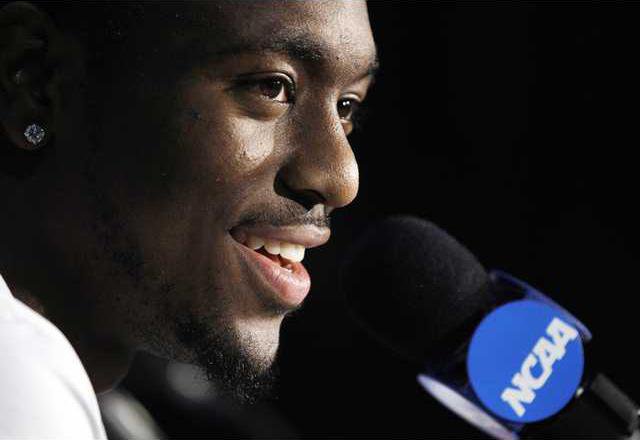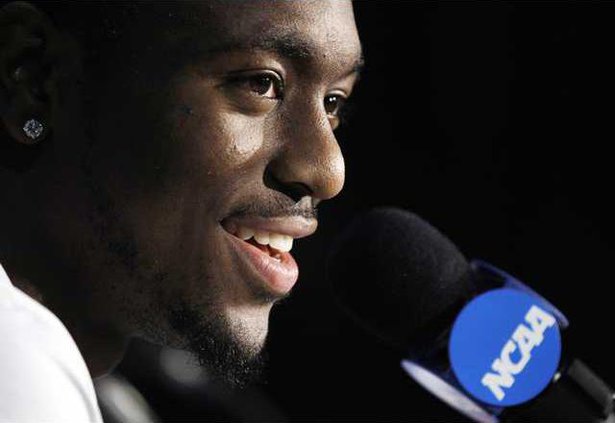HOUSTON — VCU arrived at the Final Four with its team, its bandwagon and its T-shirt. “There goes my bracket,” it says — an oh-so-fitting statement printed in gold letters and sandwiched between the school logo and the picture of a crumpled-up piece of paper.
Indeed, almost anyone who wins an office pool this year will limp home to their victory. Hardly anyone saw this coming.
But for VCU, Butler, Connecticut and Kentucky, all of whom got their first look at the court tucked inside of Reliant Stadium on Thursday, this is a time to act like they expected it all along, to focus on winning a national championship that hardly seemed likely when the first ball was tipped back in October.
Back then, VCU was listed as a 5,000-1 longshot in Vegas.
Butler was figuring out how to replace NBA-bound forward Gordon Hayward and dream up a second act after almost winning it all last year, only six miles from its tiny campus in Indianapolis.
Connecticut was picked 10th in the Big East.
Kentucky was gearing up for a transition year after losing five key players to the NBA and freshman Enes Kanter to eligibility issues while awaiting a killer recruiting class for 2011-12.
“I never thought we’d be sitting here,” Butler coach Brad Stevens said when asked what he thought of his team’s prospects in February, when the Bulldogs were 14-9 with a three-game losing streak. “But the season starts in October and it goes until at least March 1. You’re supposed to get better. It’s hard. But if you have guys willing to work through it, it can happen.”
In the first semifinal Saturday, eighth-seeded Butler (27-9) will play 11th-seeded VCU (23-11), in a matchup of underdog mid-majors that some might consider more fitting for the Maui Invitational than a Final Four bracket.
In the second game, it’s No. 3 Connecticut (30-9) vs. No. 4 Kentucky (29-8) in the rematch of a game that really was on the schedule in Maui. UConn won 84-67 back on Nov. 24. A trip to Houston wasn’t on anyone’s mind back then.
“That game showed what we could be and certainly what John needed to fix,” UConn coach Jim Calhoun said of Kentucky’s John Calipari. “It turned out, I needed to fix some things, too, but it was later because the problems showed up in the Big East.”
All these teams had problems during big portions of this season. All got better and started peaking around the beginning of March. That has culminated in probably the most inconceivable foursome in Final Four history — not a single No. 1 or 2 seed for the first time ever, and a group of teams chosen by a grand total of three people out of more than 8 million entrants in bracket contests run by ESPN and Yahoo.
“At first, it was the selection and how we shouldn’t be in the tournament,” VCU point guard Joey Rodriguez said. “Then it became, we can’t do this in this game, we won’t be able to do that in that game. We keep proving people wrong, and now, we’re here.”
Like so many players from schools in smaller conferences, the VCU group remembers watching last year’s Duke-Butler final, seeing the Bulldogs fall a bounce short of the championship and thinking, sure, that could be them. Sort of the same way people dream about winning the lottery.
Led by 33-year-old coach Shaka Smart, the Rams went only 12-6 and finished fourth in the Colonial Athletic Association. They wound up as one of the last teams placed in the tournament bracket. They took immense flak from Jay Bilas, Dick Vitale and a whole group in the bracketology set who called VCU undeserving when its name showed up and teams such as Colorado and Virginia Tech were left out. The Rams answered by winning five games on their road to the Final Four by an average of 12 points.
Now, they’re celebrities, across the nation and around their own campus — located in Richmond, Va., with enrollment of 32,000, about the same size as George Mason, the Virginia school that also made the Final Four as an 11 seed back in 2006.
“I went to the bookstore the day the Final Four T-shirts came out, and that was a mistake,” VCU guard Bradford Burgess said. “People were taking pictures, giving me hugs, signing autographs. It took me an hour and a half to get out.”
On the blue blood side of the bracket, UConn will face Kentucky in a matchup of a No. 3 seed vs. a No. 4.
Granted, these weren’t implausible picks by any means, though Kentucky fans had every reason to believe it would be another year. They lost five players to the NBA draft after last season, including the No. 1 pick, John Wall. Meanwhile, they’ve got a virtual roster of McDonald’s All-Americans signed and ready to show up in Lexington next fall.
Calipari figured out his team and got it revved up at precisely the right time. Led by freshmen Brandon Knight (East region most outstanding player) and senior Josh Harrellson (14.8 points and 9 rebounds a game in the tournament), the Wildcats returned to the Final Four for the first time since they last won it all, in 1998.
“This team went from me dragging them to them dragging me,” Calipari said. “They became empowered, and that’s when they became special. They know it now. They get it.”
The Huskies are a young team led by junior Kemba Walker, a guard from the Bronx who has added a nice mid-range and 3-point-shooting game to his repertoire and has averaged 26 points a game since UConn went on a remarkable postseason run. The Huskies, who finished the Big East at 9-9, won five straight in the conference tournament and four more in the NCAA.
UConn is in the Final Four for the second time in three years. In 2009, it was expected. This time, it’s a surprise. That places the Huskies in familiar company this week.
“My freshman year, everyone was like, ‘You’re going to make the Final Four,’” Walker said. “This time, I didn’t know if we were going to make it. We were underdogs almost the whole year. To make it the way we made it, it’s kind of special.”
HOUSTON, WE HAVE LIFT-OFF
Improbable Final Four begins on Saturday





